| District Five ATCMTD Grant |
| Overview |
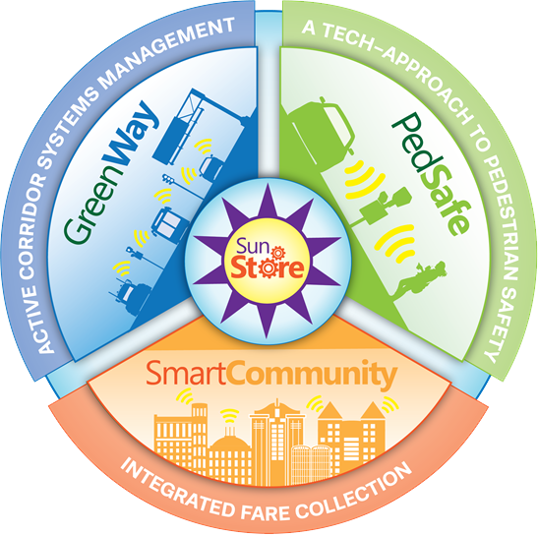
The Central Florida region just received an $11.9 million grant from the Federal Highway Administration (FHWA) to advance several Transportation Systems Management and Operations (TSM&O) technologies aimed at improving safety and easing congestion. This grant continues to build on the investments made throughout the region using TSM&O technology and strategies to improve the overall transportation network and ensure the continued economic vitality of the area. The Florida Department of Transportation (FDOT) applied for the grant in collaboration with MetroPlan Orlando and UCF. The funds came from the FHWA Advanced Transportation and Congestion Management Technologies Deployment (ATCMTD) grant program, which funds cutting-edge technologies that are ready to be deployed to enhance existing traffic capacity for commuters and businesses. The program was established under the Federal Fixing America’s Surface Transportation (FAST) Act. Central Florida's Connecting the East Orlando Communities (CEOC) project received the largest grant award from the program to date and was the only recipient in Florida. This project is scheduled for approximately five years. Combining the $11.9 million grant with local investments, CEOC is a $65 million project comprised of three interrelated programs that connect through an ongoing FDOT initiative, SunStore. Those three programs are: PedSafe, GreenWay, and SmartCommunity.
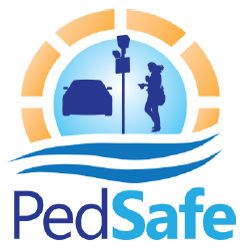 PedSafe
is an innovative pedestrian and bicycle
collision avoidance system being designed by FDOT.
Drivers will be alerted when a pedestrian or cyclist is
in the area. Also, traffic signals will be
designed to become aware of
pedestrians crossing the road.
PedSafe
is an innovative pedestrian and bicycle
collision avoidance system being designed by FDOT.
Drivers will be alerted when a pedestrian or cyclist is
in the area. Also, traffic signals will be
designed to become aware of
pedestrians crossing the road.
As with all of the regional TSM&O
deployments, collaboration between partners have been
critical to the overall success of these efforts. The
following are some of the partnering agencies for this
grant, in addition to our County and City partners:
FDOT’s
success with major projects has been based on strong
collaboration and cooperation with counties,
municipalities and other transportation agencies. In
this spirit, 28 local governments and regional agencies
have approved resolutions in support on the grant. This
reflects our regions commitment to work together with
implementing grant-related activities and deployments.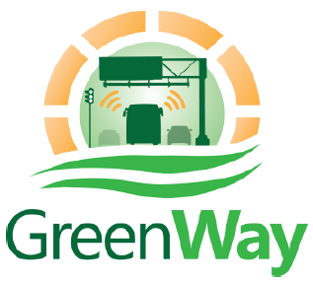 GreenWay
is designed to better utilize the multimodal transportation system by actively managing over 1,000 traffic signals within the region. This will make travel times more consistent and help reduce congestion.
GreenWay
is designed to better utilize the multimodal transportation system by actively managing over 1,000 traffic signals within the region. This will make travel times more consistent and help reduce congestion.
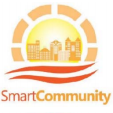 SmartCommunity
is an integrated program that connects people to the places they need to go and
provides them with the services they need to receive. This includes travel time information for driving, riding the bus, taking the train,
or using rideshare and/or car share.
SmartCommunity
is an integrated program that connects people to the places they need to go and
provides them with the services they need to receive. This includes travel time information for driving, riding the bus, taking the train,
or using rideshare and/or car share. SunStore
is FDOT’s central data storage for all the transportation system management and operations information.
SunStore includes Master Data Management, Data Fusion,
and Sensor Fusion for increased data quality. It will be
used to make the information widely available to universities, research institutions, and businesses to encourage innovation.
SunStore
is FDOT’s central data storage for all the transportation system management and operations information.
SunStore includes Master Data Management, Data Fusion,
and Sensor Fusion for increased data quality. It will be
used to make the information widely available to universities, research institutions, and businesses to encourage innovation.
Collaboration / Partners
 FDOT serves as project manager and
coordinates between state and federal governments. FDOT
also ensures the project is scaled appropriately for
other locations and applications. The Department will
contribute software, development, operations, and data
management expertise.
FDOT serves as project manager and
coordinates between state and federal governments. FDOT
also ensures the project is scaled appropriately for
other locations and applications. The Department will
contribute software, development, operations, and data
management expertise.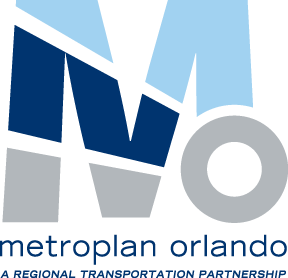 MetroPlan Orlando ensures the projects meet their
intended purposes and facilitates collaboration among
agencies and local governments. MetroPlan Orlando covers
22 cities and towns in Orange, Seminole and Osceola
Counties. Central to MetroPlan Orlando’s role in the
region is promoting scalability, prioritization, and
performance monitoring.
MetroPlan Orlando ensures the projects meet their
intended purposes and facilitates collaboration among
agencies and local governments. MetroPlan Orlando covers
22 cities and towns in Orange, Seminole and Osceola
Counties. Central to MetroPlan Orlando’s role in the
region is promoting scalability, prioritization, and
performance monitoring.
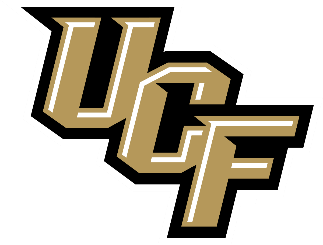 UCF uses its research capabilities and existing Future City
initiative to advance the project, while leading data
collection and analysis efforts. The initiative is
unique due to its interdisciplinary composition, strong
team or reputed experts, access to rapid economic and
population growth, and nexus of
world-class simulation, space technology and tourism
industries co-located in the Central Florida region.
UCF uses its research capabilities and existing Future City
initiative to advance the project, while leading data
collection and analysis efforts. The initiative is
unique due to its interdisciplinary composition, strong
team or reputed experts, access to rapid economic and
population growth, and nexus of
world-class simulation, space technology and tourism
industries co-located in the Central Florida region.
| Economic Impact |
The project will produce a variety
of economic benefits by improving safety, reducing
delays, improving system performance and throughput, and
providing for the efficient and reliable movement of
people, goods, and services.
FDOT, MetroPlan Orlando, UCF and
our County and City partners have all made significant
investments to not only improve safety and ease
congestion, but also to provide economic growth to the
region over the past decades. This $11.9 million grant
will be matched by $53 million in non-federal funds or
in-kind assets. In addition, the regional partners have
a long history of providing operations and maintenance
of TSM&O technology, having dedicated millions of
dollars of resources. Finally, FDOT has programmed $47
million over the next five years (the limit of the work
program) for the operations and maintenance of the
program, thus continuing to demonstrate the region’s
commitment to the overall success of the transportation
system into the future.
For the first year of the grant, UCF is investing about $700K in salaries and about $1 million in startup funds. The salary investment is recurrent. This is a total of six faculty members dedicated full-time to their Future City Initiative with the support from other relevant faculty. The University’s initiative consists of a group of researchers who have the vision to synergistically explore the wide-ranging technological advances in the service of urban residents.
A reduction in the number and severity of traffic crashes will also reduce the closure times for major arterial roadways allowing for an efficient corridor.
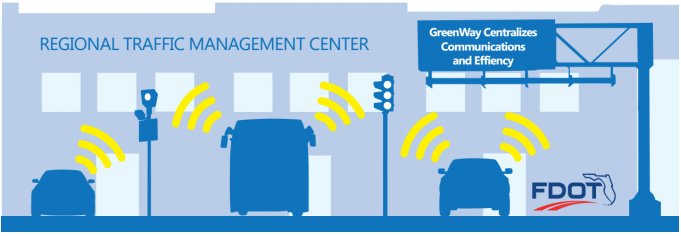
| Timeline |
This grant deployment lasts approximately five years. There are four tasks for every project component on the grant. Planning, Design, Build/Deploy, and Operations & Maintenance. The project also includes several project evaluations as well as research & optimization. As stated earlier, this grant includes four major elements: PedSafe, Greenway, SmartCommunity and SunStore. The Program was broken into several components allowing for smaller, faster deployments and concurrent development and construction.
GreenWay
GreenWay will use sensors and new traffic signal technology to help the transportation system quickly adapt to real-time traffic conditions. This is expected to make travel times more consistent and help reduce congestion. The project will connect Advance Sensor Technology, Conditional Transit Signal Priority, Adaptive Deployment Traffic Signal Interface with Track Positive Train Control (SunRail), Smart Parking Technology with Signal Performance Metrics, expand Integrated Corridor Management, and Signal Control Analytics and Visualization.
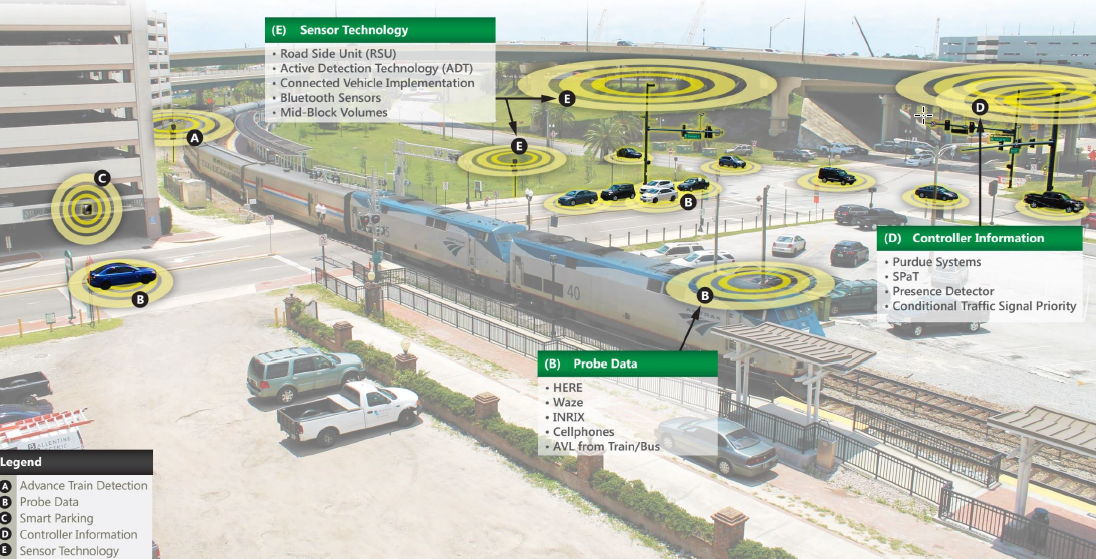
Development began in
the 3rd Quarter of 2016 and will continue until the 4th
quarter of 2018
Deployment will begin – 2018 Q2 through 2019 Q4
Operations & Maintenance – 2020 Q1 through 2021 Q4
PedSafe
PedSafe will connect advanced signal controller capability, use Connected Vehicle technologies, and existing communication capabilities to reduce the occurrence of pedestrian and bicycle crashes. The application will be easily transferable throughout the country. This system will also be tested in the Pine Hills, a community that has faced significant challenges with pedestrian safety.
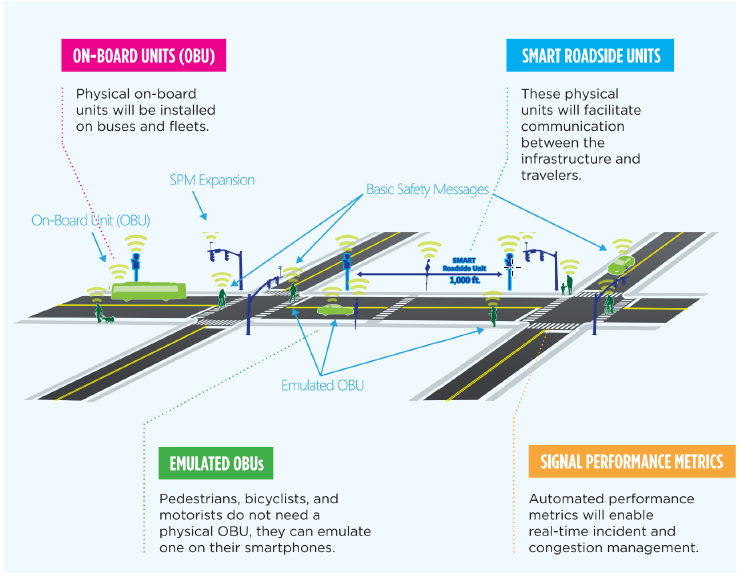
Planning – 2016 Q3
through 2018 Q1
Design – 2017 Q4
through 2018 Q2
Build/Deploy – 2018 Q3
through 2019 Q4
Operations &
Maintenance – 2020 Q1 through 2021 Q4
SmartCommunity
Through a Mobility on Demand framework, SmartCommunity leverages existing ridesharing and car sharing products to offer residents access to cars when required. SmartCommunity will allow travelers in the same area to share information and coordinate trips to destinations such as employment centers, education facilities, the grocery store, and medical treatment centers. SmartCommunity will have a benefit for low income and underserved populations in the area and help connect the community to the region
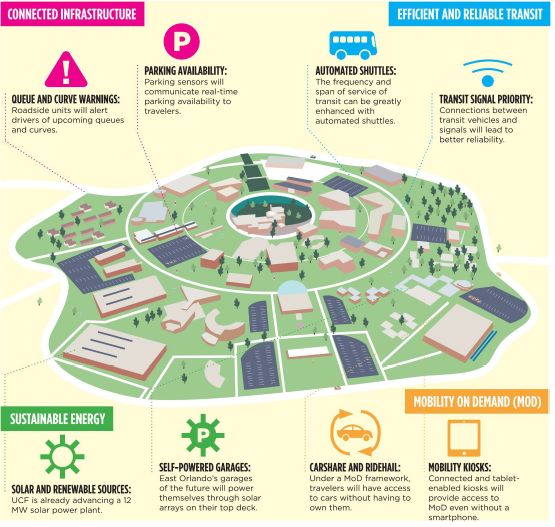
Planning – 2017 Q2 through 2018 Q1
Design – 2018 Q1 through 2018 Q3
Build/Deploy – 2018 Q4 through 2019 Q4
Operations &
Maintenance – 2020 Q1 through 2021 Q4
SunStore
Having a wide range of technology out on the roads means there will be an endless stream of data to manage. SunStore will connect and integrate many data sources, so FDOT can make the information available to universities, research institution, and businesses to encourage innovation.
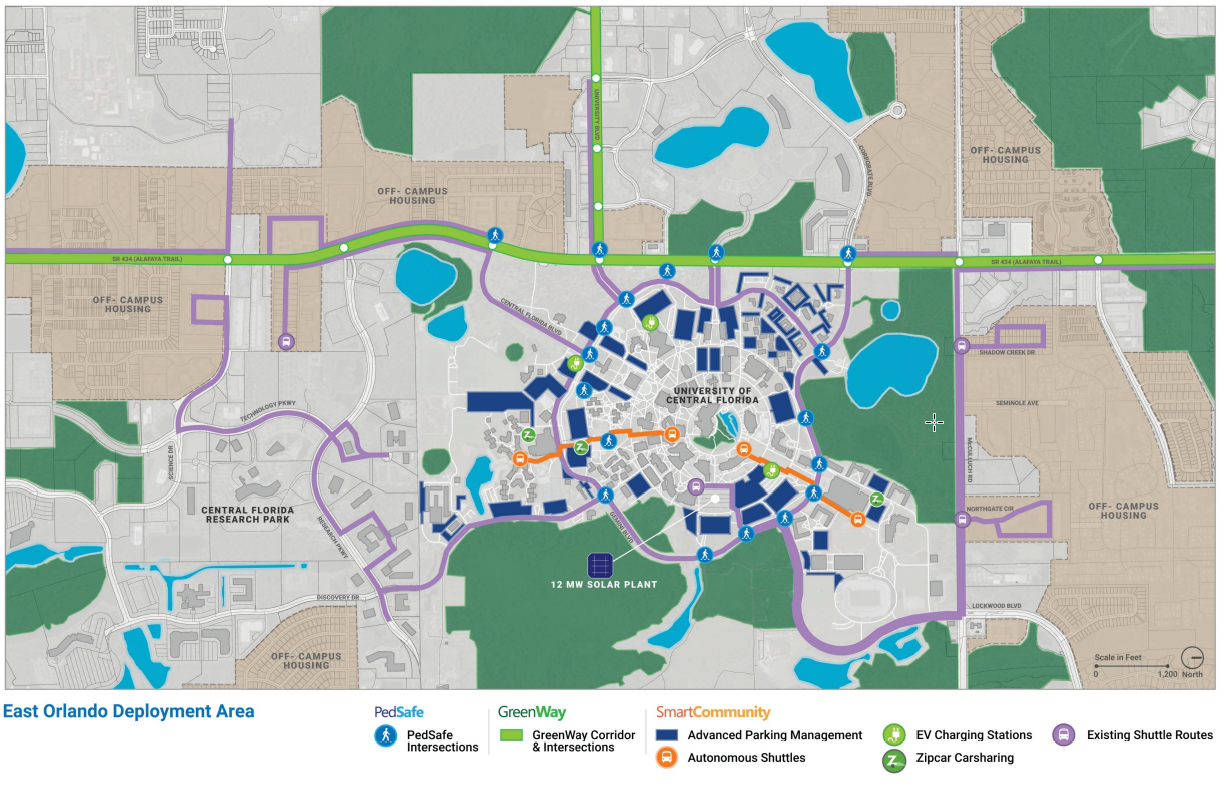
Planning – 2016 Q3 through 2017 Q2
Design – 2016 Q3 through 2017 Q4
Build/Deploy – 2017 Q1 through 2018 Q4
Maintenance & Enhancement – 2019 Q1 through 2021
Project
Reporting
PROJECT REPORTING
Project Evaluation – Before Study:
2019 Q1 through 2019 Q2; After Study/Summary: 2020 Q1
through 2020 Q4 (Annual Review for 2 years following the
5-year window)
Research & Optimization – 2018 Q1
through 2021 Q4
This
project sets the stage for implementation in the City of
Orlando, throughout Central Florida, and around the
country. This deployment can tie into Sunrail, LYNX,
Juice, Uber, and Lyft for modal choice; autonomous
shuttles in downtown; and existing city efforts in
parking management. Ultimately, this deployment will
continue to build on decades of vision and preparation.
What's Next
| Additional ATCMTD Resources |
Volume 1 Technical Application
Connected & Autonomous Vehicle Program Resources
|
|
